106 items found
Page 1 of 2
-
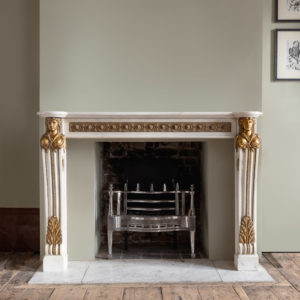
Louis XVI style Statuary marble and ormolu mounted fireplace
£18,500Louis XVI style Statuary marble and ormolu mounted fireplace
the frieze with guilloche banding inset with flowerhead bosses, each volute jambs mounted by a female bust draped in cloth, the scrolled toes with acanthus clasps above.£18,500 -
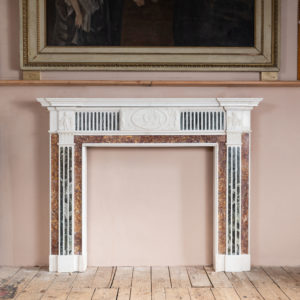
George III inlaid Statuary marble fireplace
£18,500George III inlaid Statuary marble fireplace
the moulded breakfront shelf above central tablet depicting Diana the Huntress and her dog, set within oval panel with winged putti to either side, this relief flanked by Tinos marbled inlaid flutes and corner blocks showing the Young Bacchus, the Brocatello marble jambs with pilasters inlaid with further Tinos flutes, on block feet. Late eighteenth century, restored.£18,500 -
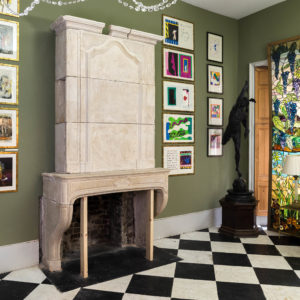
Impessive Louis XVI limestone chimneypiece,
£16,500Impessive Louis XVI limestone chimneypiece,
having a stepped carved cornice, leading to the trumeau section centred by carved frame, flanked by long carved panels above the deep mantle decorated with further panelled detail centred by a stylized cartouche raised on curved jambs with carved panels on shaped foot blocks. Price includes restoration to the cornice and patching in on left hand side of the trumeau. Removed from a property on Belgrave Square, London.£16,500 -
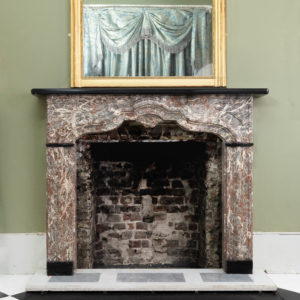
Early eighteenth century French Rance marble fireplace,
£8,500Early eighteenth century French Rance marble fireplace,
the moulded Belgian Black marble shelf above boldly shaped and moulded frieze with panelled spandrels.£8,500 -
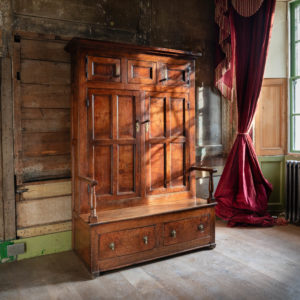
George III bacon settle
£7,500George III bacon settle
panelled throughout to front and back, the top cupboard accessible via three smaller doors, main cabinet with large wrought iron hooks, the seat with drawers below. Primarily constructed in figured field-grown ash, some other native hedgerow timber species present. Fantastically figured and patinated throughout.£7,500 -
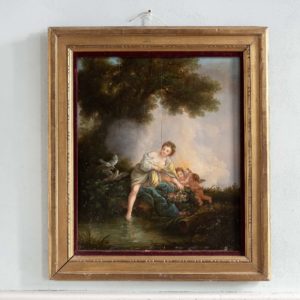
Vénus et les Amours
£6,750Vénus et les Amours
Gilt framed, velvet backed oil on board painting showing Venus between her attendants, the spirits of love, and a pair of courting doves. Based on the engraving of 1775 by Rene Gaillard, itself a copy of the painting Venus et Les Amours of 1767 by Francois Boucher.£6,750 -
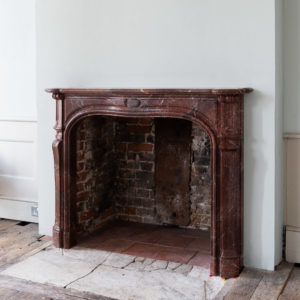
Louis XV fireplace in richly coloured Rouge Campan marble
£5,500Louis XV fireplace in richly coloured Rouge Campan marble
the elegantly shaped frieze panelled and centred with cabochon, on volute jambs, with generous moulding surrounding the aperture.£5,500 -
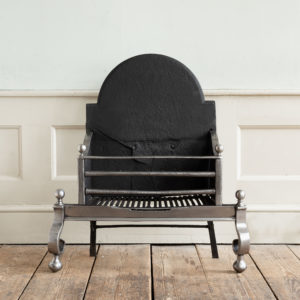
George II fire grate,
£4,750 -
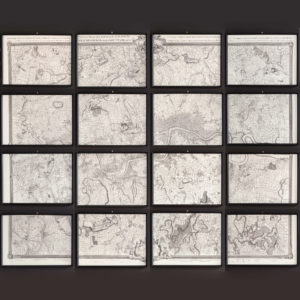
The environs of London in 1746. Impressive sixteen sheet set.
£4,500 the set of sixteen sheetsThe environs of London in 1746. Impressive sixteen sheet set.
John Rocque was of French Huguenot stock from Monosque in Provence. The London he eventually settled in, was an expanding city which had grown unchecked and by the 1730s a new map was needed. Harry Margary, a Senior Civil Scientific Engineer for the Admiralty and self-professed inventor, produced this full-size facsimile of the famous John Rocque map in 1971. The original 18th century map never joined properly due to paper shrinkage in the printing process and only the constituent copper plates joined. For this lithographically printed version Margary altered some of the edges so the maps would join and significantly cleaned up the image area.£4,500 the set of sixteen sheets -
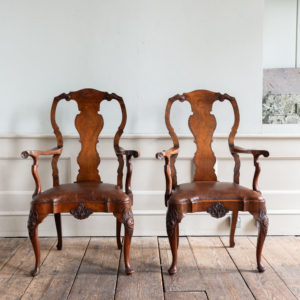
Pair of early eighteenth century style walnut and leather upholstered armchairs,
£3,850Pair of early eighteenth century style walnut and leather upholstered armchairs,
the central splat crossbanded, with carving to the seat rail and cabriole legs.£3,850 -

Eighteenth century painted cabinet
£3,750Eighteenth century painted cabinet
the exterior retaining its remarkable historic and patinated paint finish, the cupboard doors with iron strap hinges opening to reveal arsenic green shelved interior, all raised on later turned feet.£3,750 -
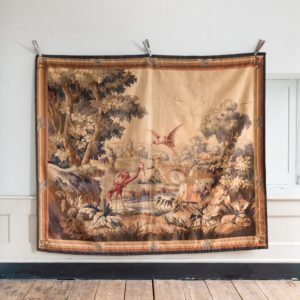
Verdure tapestry in the eighteenth century taste,
£3,750Verdure tapestry in the eighteenth century taste,
the rectangular shaped tapestry with stylised frame, leading to a landscape centred by two storks, one in flight the other wadding for prey in a river, flanked by rocks, trees and vegetation above a stone bridge with goat, leading the eye to a cottage in the distance set on the edge of a forest with hills in the back ground. Some areas of damage as per the images.£3,750 -
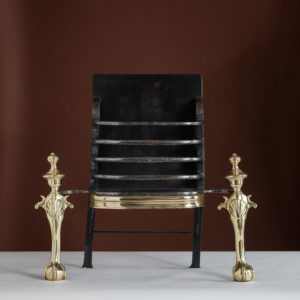
Early eighteenth century brass and iron fire grate,
£2,800 -
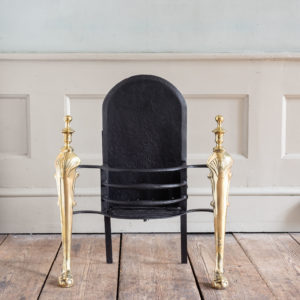
Queen Anne brass and wrought iron fire basket
£2,800Queen Anne brass and wrought iron fire basket
with urn finials, the cabriole legs with claw and ball feet, the rear legs replaced.£2,800 -
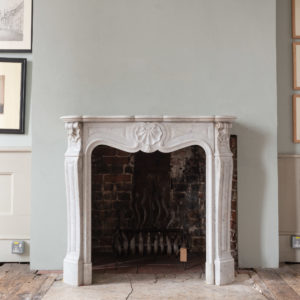
Small French Rococo Carrara marble fireplace
£2,600Small French Rococo Carrara marble fireplace
with scallop shell to the centre of the shaped frieze.£2,600 -
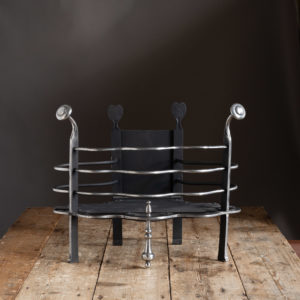
Small eighteenth century Dutch fire grate
£2,000Small eighteenth century Dutch fire grate
wrought iron, with shaped rails and heart motifs to the rear.£2,000 -
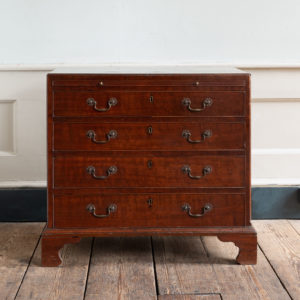
Eighteenth century mahogany chest of drawers,
£1,750Eighteenth century mahogany chest of drawers,
attractively patinated and of typical form, with brushing slide above four graduated drawers with original swan's-neck brasses, on bracket feet. Provenance: Farmleigh House, Ireland£1,750 -
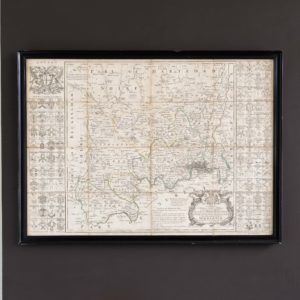
Middlesex by R.W. Seale, c1760
£950Middlesex by R.W. Seale, c1760
Title: 'To the Most Noble / Thomas Holles Pelham / Duke of NEWCASTLE. / Lord Lieutenant of Middlesex & Westminster, His Majesty's / Principal Secretary of State, Chancellor of the University / of Cambridge, & Knight of the Most Noble Order of y e GARTER. / This MAP of the COUNTY of MIDDLESEX / is Dedicated by his grace's most humble Servant / R.W. Seale.£950 -
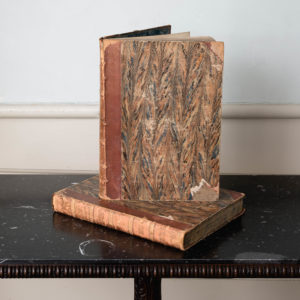
Picturesque Views on the River Thames by Samuel Ireland, 1792
£850Picturesque Views on the River Thames by Samuel Ireland, 1792
2 Volumes of 209 and 258 pages with 52 aquatint plates picturing views along the river Thames including Blenheim Castle, Windsor Castle, London bridges, Westminster Abbey, and The Royal Naval Hospital at Greenwich. Original half calf, marbled binding of 1792, rubbed and worn with faint spotting. Samuel Ireland produced a series of these scenic views of British rivers at the end of the 18th Century as the fear of French invasion prompted a national turn towards patriotic and contemplative representations of domestic subjects.£850 -
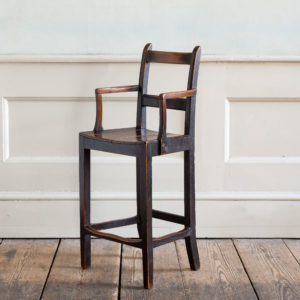
Late eighteenth century children’s chair,
£800 -
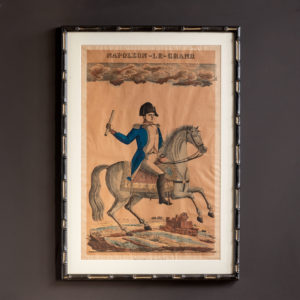
Napoleon-Le-Grand
£800Napoleon-Le-Grand
Jean-Charles Pellerin (1756 - 1836) was a French illustrator, artist, and printer. Born in Epinal, France.£800 -
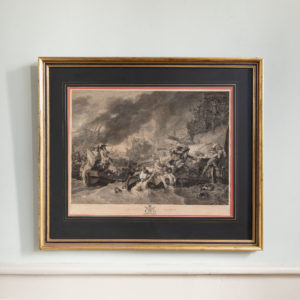
The Battle at La Hogue
£750The Battle at La Hogue
A large framed and mounted black line engraving by William Wollett afer the painting by Benjamin West showing the Anglo-Dutch naval victory at La Hogue off the coast of Normandy in 1692. " Standing in a boat at the left ... Vice Admiral George Rooke embodies heroic command with his upright posture and raised sword... Beached in the center distance is the French flagship, the Royal Sun. Actually burned and sunk a few days before this encounter, the Royal Sun is here deliberately refloated -- only to be run against the cliffs so that West might symbolize the French defeat." U.S. National Gallery of Art, Washington D.C.£750 -
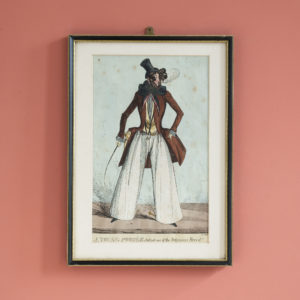
‘A Young Poodle, but not one of the Sagacious Breed’
£520‘A Young Poodle, but not one of the Sagacious Breed’
Caricaturist, presumably of Irish background, but undocumented. Responsible for a small number of plates in a distinctive hand. Unclear whether he etched them all or only designed them. Never a publisher. Worked for P.Roberts and J.Aitken. Many unsigned prints by both men may well be by him.£520 -
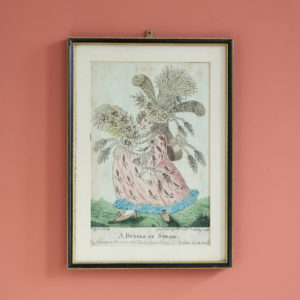
A Bundle of Straw, My Spouse is Remarkable Tasty in his Dress & he likes to see me so.
£520A Bundle of Straw, My Spouse is Remarkable Tasty in his Dress & he likes to see me so.
Caricaturist, presumably of Irish background, but undocumented. Responsible for a small number of plates in a distinctive hand. Unclear whether he etched them all or only designed them. Never a publisher. Worked for P.Roberts and J.Aitken. Many unsigned prints by both men may well be by him.£520 -
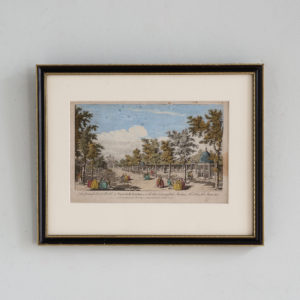
The Grand South Walk in Vaux-Hall Gardens, with the Triumphal Arches, Mr Handels Statue, &c.
£450 -
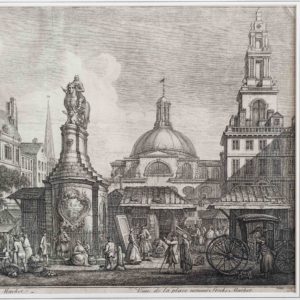
The Stocks Market,
£425The Stocks Market,
A mounted and gilt framed engracing depicting the Stocks Market in the City of London by Henry Fletcher after the painting by Joseph Nicholls. The Stocks Market existed between 1282 and 1737 on the current site of the Mansion House and has given it's name to the Bourses of the English speaking world. The statue, of Charles II trampling Oliver Cromwell underoot was the subject of a satirical verse from the pen of Andrew Marvell: "But a market, as some say, doth fit the King well, Who the Parliament too — and revenue doth sell; And others, to make the similitude hold. Say his Majesty too — is oft purchased and sold."£425 -
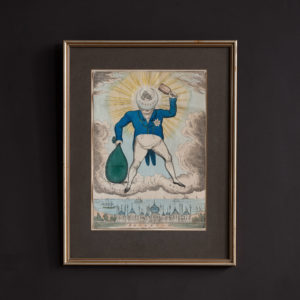
A total Eclipse, or The Moon passing the Sun’s disc
£380A total Eclipse, or The Moon passing the Sun’s disc
Hand coloured line engraving by John Fairburn. King George IV's star is eclipsed by the crecent moon of Catherine of Brunswick while suspended in the sky over the Brighton Pavillion. In his right hand he holds a sack full of slanders. A commentary on the acrimonious public divorce of the King and the Queen Consort in the 1820s;£380 -
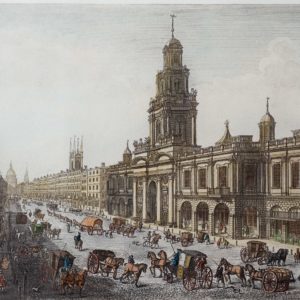
A View of the Royal Exchange London
£370A View of the Royal Exchange London
A framed and mounted hand-coloured engraving showing the Royal Exchange in its second form as designed and built by the architect Edward Jarman in 1669.£370 -
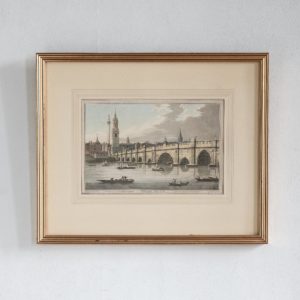
London Bridge
£295 -
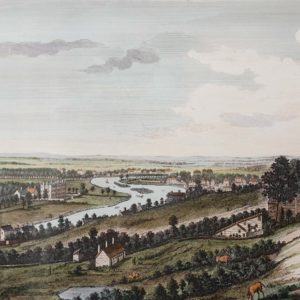
West View of Richmond from the Star & Garter
£270West View of Richmond from the Star & Garter
A framed and mounted, hand coloured engraving showing the Thames valley looking west over Richmond and Twickenham from a position besides the famous Star and Garter hotel at the top of Richmond Hill.£270 -
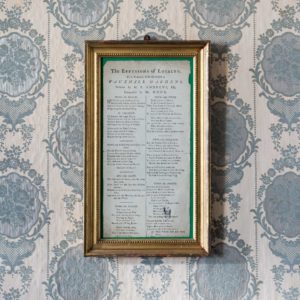
The Effusions of Loyalty, to be performed this evening at Vauxhall Gardens
£240The Effusions of Loyalty, to be performed this evening at Vauxhall Gardens
Written by M.P. Andrews, Esq. and composed by Mr. Hook£240 -
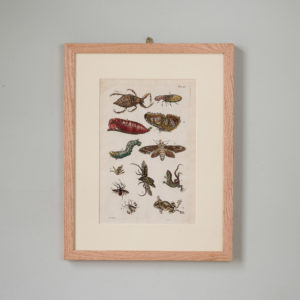
Natural History of Carolina, Florida and the Bahama Islands, published 1729 – 1747.
£225Natural History of Carolina, Florida and the Bahama Islands, published 1729 – 1747.
Mark Catesby was born in Essex to a family owned a farm and house, Holgate, in Sudbury, Suffolk. His acquaintance with the naturalist Reverend John Ray, a leading English naturalist of the late 17th century and co-author of an early classic study on birds started Catesby’s life-long becoming interest in natural history, which he went on to study in London. His life changes when in 1712, he arrived at Williamsburg, Virginia, accompanying his married sister Elizabeth Cocke and two of her children. During his seven-year stay in Virginia that Catesby developed a passionate in the native flora and fauna. He began collecting botanical specimens, especially seeds, and sending them to friends in England and he met William Byrd II, who was an amateur naturalist, a member of the colonial Council and a Fellow of the Royal Society. When he returned to England in 1719, influential members of the Royal Society, then chaired by Sir Isaac Newton, had learned of his work in the colonies. Led by William Sherard, “one of the most celebrated botanists of the age,” members began soliciting sponsors to finance Catesby for a botanical expedition to South Carolina. By 1722, Catesby was again crossing the Atlantic to further his work in the New World. Catesby, was one of the first people to recognize how natural and man-made destruction and depredation of a species’ habitat lead to extinction. He was the first to depict birds, in conjunction with environmentally relevant plants. He returned to England in 1726, and then spent the subsequent two decades years developing his work that would eventually be published as, "The Natural History of Carolina, Florida, and the Bahama Islands" It was first fully illustrated study of the natural history of North America and the most comprehensive to date. Working virtually alone, Catesby personally oversaw every aspect of the work’s production, even learning the difficult art of etching on copper plates. To finance this expensive printing project, Catesby sought subscriptions, offering his book in sections of 20 plates to be published every four months. Published in eleven sections and featuring more than 220 hand-coloured etchings. Published in eleven sections and featuring more than 220 hand-coloured etchings. He personally presented the first section to Her Majesty Queen Caroline in May 1729, and later he dedicated the first volume of the Natural History to her. Following a collapse, Mark Catesby died at his home on Old Street, London, on 23 December 1749, and he was buried in the churchyard of St Luke’s Church£225 -
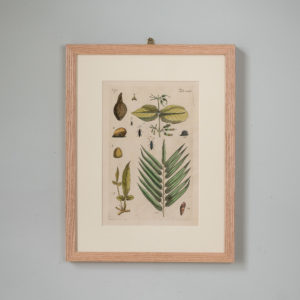
Natural History of Carolina, Florida and the Bahama Islands, published 1729 – 1747.
£225Natural History of Carolina, Florida and the Bahama Islands, published 1729 – 1747.
Mark Catesby was born in Essex to a family owned a farm and house, Holgate, in Sudbury, Suffolk. His acquaintance with the naturalist Reverend John Ray, a leading English naturalist of the late 17th century and co-author of an early classic study on birds started Catesby’s life-long becoming interest in natural history, which he went on to study in London. His life changes when in 1712, he arrived at Williamsburg, Virginia, accompanying his married sister Elizabeth Cocke and two of her children. During his seven-year stay in Virginia that Catesby developed a passionate in the native flora and fauna. He began collecting botanical specimens, especially seeds, and sending them to friends in England and he met William Byrd II, who was an amateur naturalist, a member of the colonial Council and a Fellow of the Royal Society. When he returned to England in 1719, influential members of the Royal Society, then chaired by Sir Isaac Newton, had learned of his work in the colonies. Led by William Sherard, “one of the most celebrated botanists of the age,” members began soliciting sponsors to finance Catesby for a botanical expedition to South Carolina. By 1722, Catesby was again crossing the Atlantic to further his work in the New World. Catesby, was one of the first people to recognize how natural and man-made destruction and depredation of a species’ habitat lead to extinction. He was the first to depict birds, in conjunction with environmentally relevant plants. He returned to England in 1726, and then spent the subsequent two decades years developing his work that would eventually be published as, "The Natural History of Carolina, Florida, and the Bahama Islands" It was first fully illustrated study of the natural history of North America and the most comprehensive to date. Working virtually alone, Catesby personally oversaw every aspect of the work’s production, even learning the difficult art of etching on copper plates. To finance this expensive printing project, Catesby sought subscriptions, offering his book in sections of 20 plates to be published every four months. Published in eleven sections and featuring more than 220 hand-coloured etchings. Published in eleven sections and featuring more than 220 hand-coloured etchings. He personally presented the first section to Her Majesty Queen Caroline in May 1729, and later he dedicated the first volume of the Natural History to her. Following a collapse, Mark Catesby died at his home on Old Street, London, on 23 December 1749, and he was buried in the churchyard of St Luke’s Church£225 -
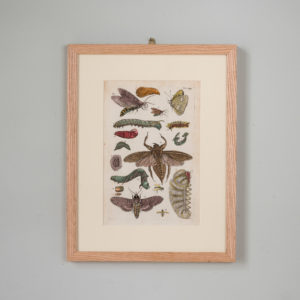
Natural History of Carolina, Florida and the Bahama Islands, published 1729 – 1747.
£225Natural History of Carolina, Florida and the Bahama Islands, published 1729 – 1747.
Mark Catesby was born in Essex to a family owned a farm and house, Holgate, in Sudbury, Suffolk. His acquaintance with the naturalist Reverend John Ray, a leading English naturalist of the late 17th century and co-author of an early classic study on birds started Catesby’s life-long becoming interest in natural history, which he went on to study in London. His life changes when in 1712, he arrived at Williamsburg, Virginia, accompanying his married sister Elizabeth Cocke and two of her children. During his seven-year stay in Virginia that Catesby developed a passionate in the native flora and fauna. He began collecting botanical specimens, especially seeds, and sending them to friends in England and he met William Byrd II, who was an amateur naturalist, a member of the colonial Council and a Fellow of the Royal Society. When he returned to England in 1719, influential members of the Royal Society, then chaired by Sir Isaac Newton, had learned of his work in the colonies. Led by William Sherard, “one of the most celebrated botanists of the age,” members began soliciting sponsors to finance Catesby for a botanical expedition to South Carolina. By 1722, Catesby was again crossing the Atlantic to further his work in the New World. Catesby, was one of the first people to recognize how natural and man-made destruction and depredation of a species’ habitat lead to extinction. He was the first to depict birds, in conjunction with environmentally relevant plants. He returned to England in 1726, and then spent the subsequent two decades years developing his work that would eventually be published as, "The Natural History of Carolina, Florida, and the Bahama Islands" It was first fully illustrated study of the natural history of North America and the most comprehensive to date. Working virtually alone, Catesby personally oversaw every aspect of the work’s production, even learning the difficult art of etching on copper plates. To finance this expensive printing project, Catesby sought subscriptions, offering his book in sections of 20 plates to be published every four months. Published in eleven sections and featuring more than 220 hand-coloured etchings. Published in eleven sections and featuring more than 220 hand-coloured etchings. He personally presented the first section to Her Majesty Queen Caroline in May 1729, and later he dedicated the first volume of the Natural History to her. Following a collapse, Mark Catesby died at his home on Old Street, London, on 23 December 1749, and he was buried in the churchyard of St Luke’s Church£225 -
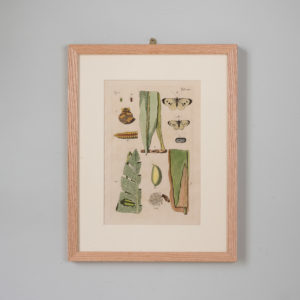
Natural History of Carolina, Florida and the Bahama Islands, published 1729 – 1747.
£225Natural History of Carolina, Florida and the Bahama Islands, published 1729 – 1747.
Mark Catesby was born in Essex to a family owned a farm and house, Holgate, in Sudbury, Suffolk. His acquaintance with the naturalist Reverend John Ray, a leading English naturalist of the late 17th century and co-author of an early classic study on birds started Catesby’s life-long becoming interest in natural history, which he went on to study in London. His life changes when in 1712, he arrived at Williamsburg, Virginia, accompanying his married sister Elizabeth Cocke and two of her children. During his seven-year stay in Virginia that Catesby developed a passionate in the native flora and fauna. He began collecting botanical specimens, especially seeds, and sending them to friends in England and he met William Byrd II, who was an amateur naturalist, a member of the colonial Council and a Fellow of the Royal Society. When he returned to England in 1719, influential members of the Royal Society, then chaired by Sir Isaac Newton, had learned of his work in the colonies. Led by William Sherard, “one of the most celebrated botanists of the age,” members began soliciting sponsors to finance Catesby for a botanical expedition to South Carolina. By 1722, Catesby was again crossing the Atlantic to further his work in the New World. Catesby, was one of the first people to recognize how natural and man-made destruction and depredation of a species’ habitat lead to extinction. He was the first to depict birds, in conjunction with environmentally relevant plants. He returned to England in 1726, and then spent the subsequent two decades years developing his work that would eventually be published as, "The Natural History of Carolina, Florida, and the Bahama Islands" It was first fully illustrated study of the natural history of North America and the most comprehensive to date. Working virtually alone, Catesby personally oversaw every aspect of the work’s production, even learning the difficult art of etching on copper plates. To finance this expensive printing project, Catesby sought subscriptions, offering his book in sections of 20 plates to be published every four months. Published in eleven sections and featuring more than 220 hand-coloured etchings. Published in eleven sections and featuring more than 220 hand-coloured etchings. He personally presented the first section to Her Majesty Queen Caroline in May 1729, and later he dedicated the first volume of the Natural History to her. Following a collapse, Mark Catesby died at his home on Old Street, London, on 23 December 1749, and he was buried in the churchyard of St Luke’s Church£225 -
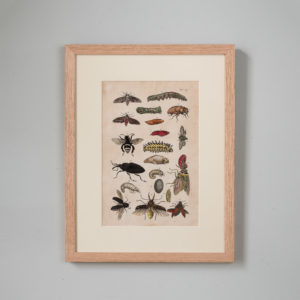
Natural History of Carolina, Florida and the Bahama Islands, published 1729 – 1747.
£225Natural History of Carolina, Florida and the Bahama Islands, published 1729 – 1747.
Mark Catesby was born in Essex to a family owned a farm and house, Holgate, in Sudbury, Suffolk. His acquaintance with the naturalist Reverend John Ray, a leading English naturalist of the late 17th century and co-author of an early classic study on birds started Catesby’s life-long becoming interest in natural history, which he went on to study in London. His life changes when in 1712, he arrived at Williamsburg, Virginia, accompanying his married sister Elizabeth Cocke and two of her children. During his seven-year stay in Virginia that Catesby developed a passionate in the native flora and fauna. He began collecting botanical specimens, especially seeds, and sending them to friends in England and he met William Byrd II, who was an amateur naturalist, a member of the colonial Council and a Fellow of the Royal Society. When he returned to England in 1719, influential members of the Royal Society, then chaired by Sir Isaac Newton, had learned of his work in the colonies. Led by William Sherard, “one of the most celebrated botanists of the age,” members began soliciting sponsors to finance Catesby for a botanical expedition to South Carolina. By 1722, Catesby was again crossing the Atlantic to further his work in the New World. Catesby, was one of the first people to recognize how natural and man-made destruction and depredation of a species’ habitat lead to extinction. He was the first to depict birds, in conjunction with environmentally relevant plants. He returned to England in 1726, and then spent the subsequent two decades years developing his work that would eventually be published as, "The Natural History of Carolina, Florida, and the Bahama Islands" It was first fully illustrated study of the natural history of North America and the most comprehensive to date. Working virtually alone, Catesby personally oversaw every aspect of the work’s production, even learning the difficult art of etching on copper plates. To finance this expensive printing project, Catesby sought subscriptions, offering his book in sections of 20 plates to be published every four months. Published in eleven sections and featuring more than 220 hand-coloured etchings. Published in eleven sections and featuring more than 220 hand-coloured etchings. He personally presented the first section to Her Majesty Queen Caroline in May 1729, and later he dedicated the first volume of the Natural History to her. Following a collapse, Mark Catesby died at his home on Old Street, London, on 23 December 1749, and he was buried in the churchyard of St Luke’s Church£225 -
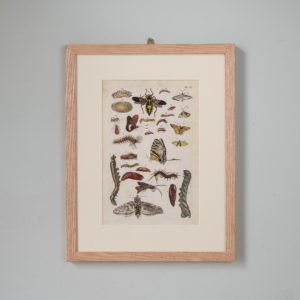
Natural History of Carolina, Florida and the Bahama Islands, published 1729 – 1747.
£225Natural History of Carolina, Florida and the Bahama Islands, published 1729 – 1747.
Mark Catesby was born in Essex to a family owned a farm and house, Holgate, in Sudbury, Suffolk. His acquaintance with the naturalist Reverend John Ray, a leading English naturalist of the late 17th century and co-author of an early classic study on birds started Catesby’s life-long becoming interest in natural history, which he went on to study in London. His life changes when in 1712, he arrived at Williamsburg, Virginia, accompanying his married sister Elizabeth Cocke and two of her children. During his seven-year stay in Virginia that Catesby developed a passionate in the native flora and fauna. He began collecting botanical specimens, especially seeds, and sending them to friends in England and he met William Byrd II, who was an amateur naturalist, a member of the colonial Council and a Fellow of the Royal Society. When he returned to England in 1719, influential members of the Royal Society, then chaired by Sir Isaac Newton, had learned of his work in the colonies. Led by William Sherard, “one of the most celebrated botanists of the age,” members began soliciting sponsors to finance Catesby for a botanical expedition to South Carolina. By 1722, Catesby was again crossing the Atlantic to further his work in the New World. Catesby, was one of the first people to recognize how natural and man-made destruction and depredation of a species’ habitat lead to extinction. He was the first to depict birds, in conjunction with environmentally relevant plants. He returned to England in 1726, and then spent the subsequent two decades years developing his work that would eventually be published as, "The Natural History of Carolina, Florida, and the Bahama Islands" It was first fully illustrated study of the natural history of North America and the most comprehensive to date. Working virtually alone, Catesby personally oversaw every aspect of the work’s production, even learning the difficult art of etching on copper plates. To finance this expensive printing project, Catesby sought subscriptions, offering his book in sections of 20 plates to be published every four months. Published in eleven sections and featuring more than 220 hand-coloured etchings. Published in eleven sections and featuring more than 220 hand-coloured etchings. He personally presented the first section to Her Majesty Queen Caroline in May 1729, and later he dedicated the first volume of the Natural History to her. Following a collapse, Mark Catesby died at his home on Old Street, London, on 23 December 1749, and he was buried in the churchyard of St Luke’s Church£225 -
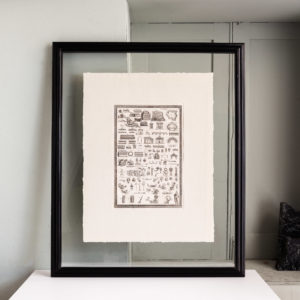
Piranesi, Diverse maniere d’adornare i cammini ed ogni altra parte degli edifizi desunte dall’architettura egizia, Etrusca e Greca,
£200Piranesi, Diverse maniere d’adornare i cammini ed ogni altra parte degli edifizi desunte dall’architettura egizia, Etrusca e Greca,
Giovanni Battista Piranesi, was an etcher, engraver, designer, architect, archaeologist, and theorist.£200 -
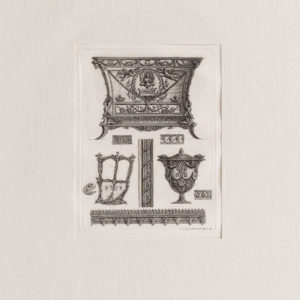
Piranesi, Designs for furniture, 1769
£200Piranesi, Designs for furniture, 1769
Giovanni Battista Piranesi, was an etcher, engraver, designer, architect, archaeologist, and theorist.£200 -
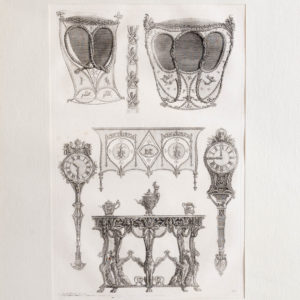
Piranesi, Designs for furniture, 1769
£200Piranesi, Designs for furniture, 1769
Giovanni Battista Piranesi, was an etcher, engraver, designer, architect, archaeologist, and theorist.£200 -
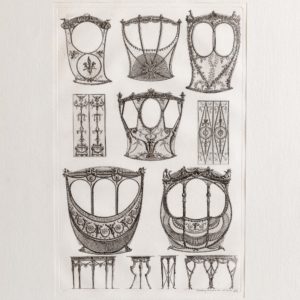
Piranesi, Designs for furniture, 1769
£200Piranesi, Designs for furniture, 1769
Giovanni Battista Piranesi, was an etcher, engraver, designer, architect, archaeologist, and theorist.£200 -
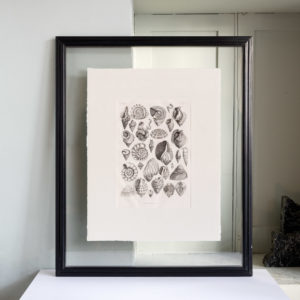
Piranesi, Different shells thought to inspire the forms of Etruscan vases, 1769
£200Piranesi, Different shells thought to inspire the forms of Etruscan vases, 1769
Giovanni Battista Piranesi, was an etcher, engraver, designer, architect, archaeologist, and theorist.£200 -
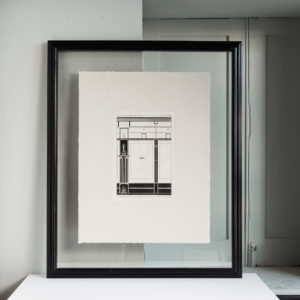
Pompei Interior, copper-engravings published 1796
£200 -
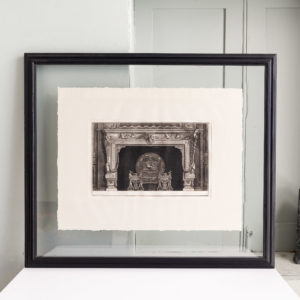
Giovanni Battista Piranesi, Design for a Fireplace, published 1769.
£200Giovanni Battista Piranesi, Design for a Fireplace, published 1769.
Giovanni Battista Piranesi, was an etcher, engraver, designer, architect, archaeologist, and theorist.£200 -
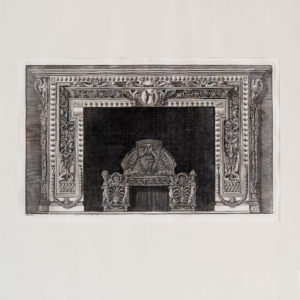
Giovanni Battista Piranesi, Design for a Fireplace, published 1769.
£200Giovanni Battista Piranesi, Design for a Fireplace, published 1769.
Giovanni Battista Piranesi, was an etcher, engraver, designer, architect, archaeologist, and theorist.£200 -
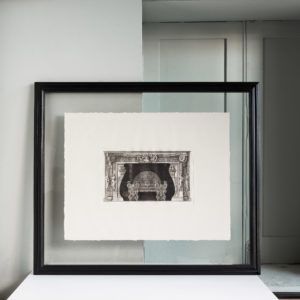
Giovanni Battista Piranesi, Design for a Fireplace, published 1769.
£200Giovanni Battista Piranesi, Design for a Fireplace, published 1769.
Giovanni Battista Piranesi, was an etcher, engraver, designer, architect, archaeologist, and theorist.£200 -
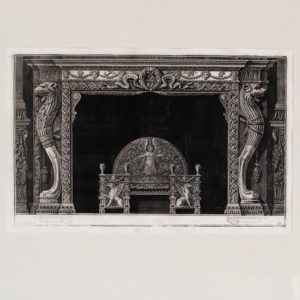
Giovanni Battista Piranesi, Design for a Fireplace, published 1769.
£200Giovanni Battista Piranesi, Design for a Fireplace, published 1769.
Giovanni Battista Piranesi, was an etcher, engraver, designer, architect, archaeologist, and theorist.£200 -
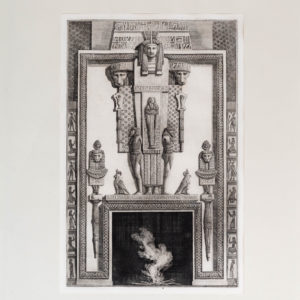
Giovanni Battista Piranesi, Design for an Egyptian style Fireplace, published 1769.
£200Giovanni Battista Piranesi, Design for an Egyptian style Fireplace, published 1769.
Giovanni Battista Piranesi, was an etcher, engraver, designer, architect, archaeologist, and theorist.£200 -
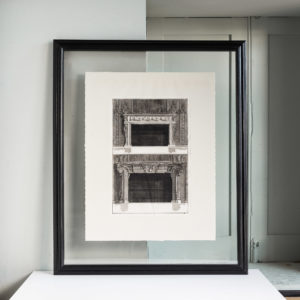
Giovanni Battista Piranesi, Designs for two Fireplaces, published 1769.
£200Giovanni Battista Piranesi, Designs for two Fireplaces, published 1769.
Giovanni Battista Piranesi, was an etcher, engraver, designer, architect, archaeologist, and theorist.£200 -
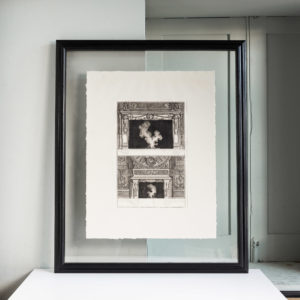
Giovanni Battista Piranesi, Designs for two Fireplaces, published 1769.
£200Giovanni Battista Piranesi, Designs for two Fireplaces, published 1769.
Giovanni Battista Piranesi, was an etcher, engraver, designer, architect, archaeologist, and theorist.£200 -
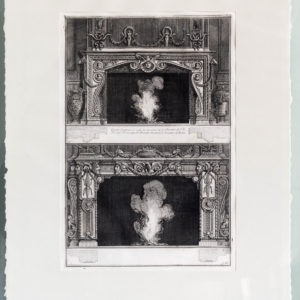
Giovanni Battista Piranesi, Designs for two Fireplaces, published 1769.
£200Giovanni Battista Piranesi, Designs for two Fireplaces, published 1769.
Giovanni Battista Piranesi, was an etcher, engraver, designer, architect, archaeologist, and theorist.£200 -
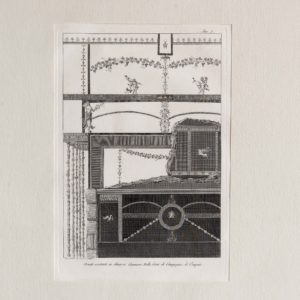
Pompei Interior, copper-engravings published 1796
£200 -
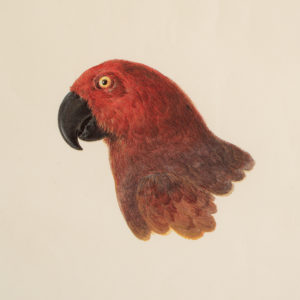
Parrot Heads after Aert Schouman, ‘The great Lory-Parrot’,
£195 each -
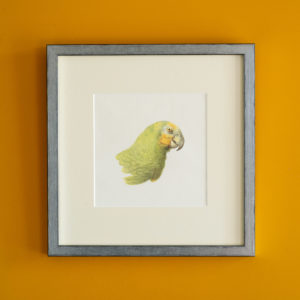
Parrot Heads after Aert Schouman, ‘Yellow Amazon Parrot’,
£195 each -
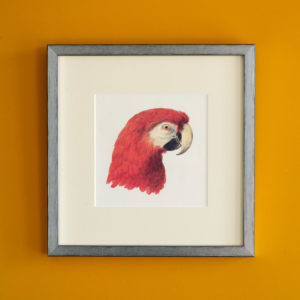
Parrot Heads after Aert Schouman, ‘Arakanga’,
£195 each -
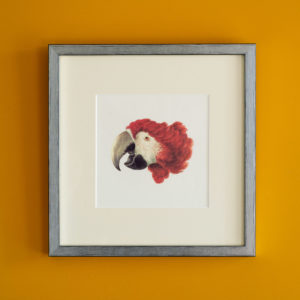
Parrot Heads after Aert Schouman, ‘The Ara Head’,
£195 each -
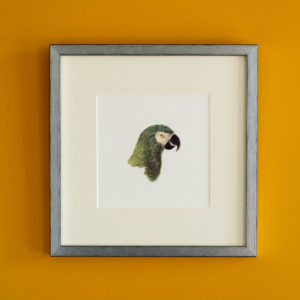
Parrot Heads after Aert Schouman, ‘The Maracana Ara’,
£195 each -
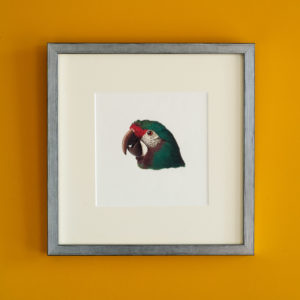
Parrot Heads after Aert Schouman, ‘The great military Ara’,
£195 each -
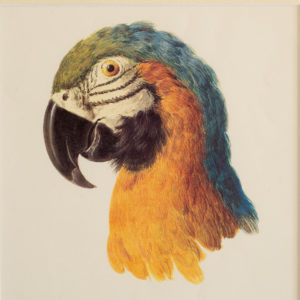
Parrot Heads after Aert Schouman, ‘The Ararauna’,
£195 each -
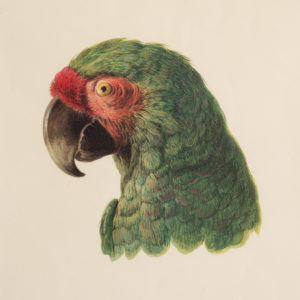
Parrot Heads after Aert Schouman, ‘The Military Ara’,
£195 each -
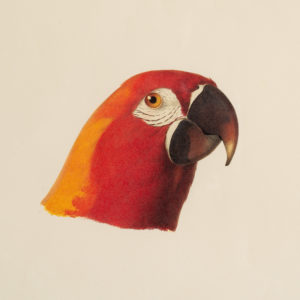
Parrot Heads after Aert Schouman, ‘The Tricolour Ara’,
£195 each -
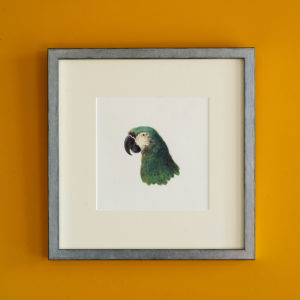
Parrot Heads after Aert Schouman, ‘The Macaronana Ara’,
£195 each -
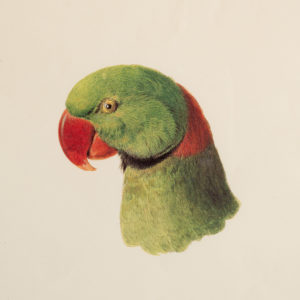
Parrot Heads after Aert Schouman, ‘Great-collared Parakeet’,
£195 each -
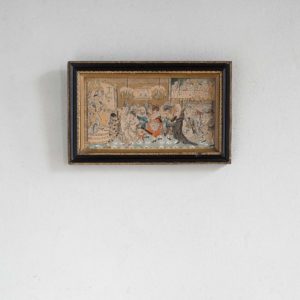
The Ball,
£180 -
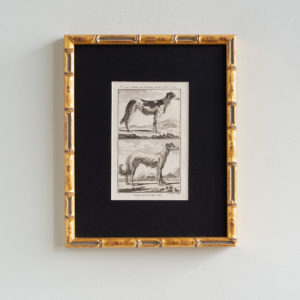
18th Century French Engravings of Dogs
£175 each18th Century French Engravings of Dogs
Published for, Histoire naturelle, générale et particulière (1749–1804), which was the first modern attempt to systematically present all existing knowledge in the fields of natural history, geology, and anthropology.£175 each -
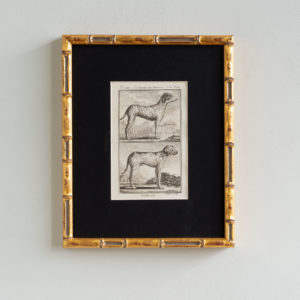
18th Century French Engravings of Dogs
£175 each18th Century French Engravings of Dogs
Published for, Histoire naturelle, générale et particulière (1749–1804), which was the first modern attempt to systematically present all existing knowledge in the fields of natural history, geology, and anthropology.£175 each -
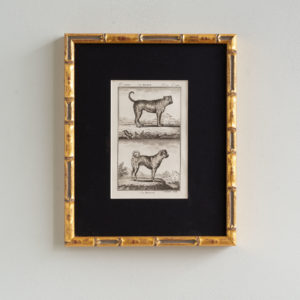
18th Century French Engravings of Dogs
£175 each18th Century French Engravings of Dogs
Published for, Histoire naturelle, générale et particulière (1749–1804), which was the first modern attempt to systematically present all existing knowledge in the fields of natural history, geology, and anthropology.£175 each -
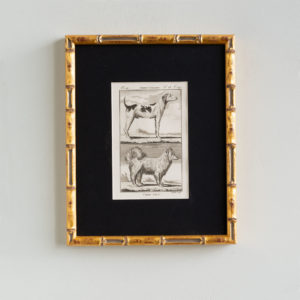
18th Century French Engravings of Dogs
£175 each18th Century French Engravings of Dogs
Published for, Histoire naturelle, générale et particulière (1749–1804), which was the first modern attempt to systematically present all existing knowledge in the fields of natural history, geology, and anthropology.£175 each -
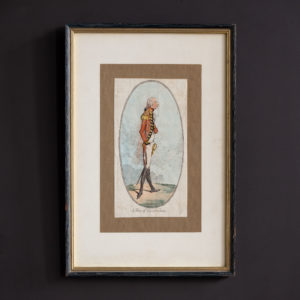
William Frederick, 2nd Duke of Gloucester (‘A slice of Glo’ster cheese’) by James Gillray
£160William Frederick, 2nd Duke of Gloucester (‘A slice of Glo’ster cheese’) by James Gillray
A whole length hand-coloured Georgian caricature-portrait of Prince William Frederick of Gloucester. Designed in an oval setting, the Prince is shown in profile, facing rightwards, and bearing a strong and suggestive resemblance to his uncle King George III. He is shown wearing military uniform, having served in Flanders in 1794 during the Revolutionary Wars. The Prince, later the Duke, of Gloucester had become popularly and affectionately known as 'Slice of Gloster' or simply 'Slice' by the early 1700s.£160 -
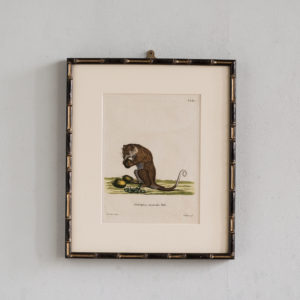
De Buffon, 18th Century natural history,
£150 eachDe Buffon, 18th Century natural history,
Animal prints, based on he work of Georges-Louis Leclerc, count de Buffon, who attempted to systematically present all existing knowledge in the fields of natural history, geology, and anthropology in a single publication. Published c1740, Latin and German text. Presented in faux bamboo frames. 'Didelphys Orientalis Pall.'£150 each -
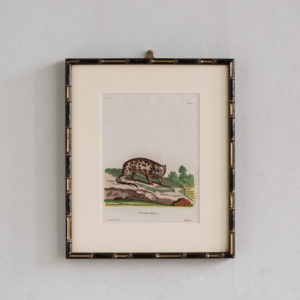
De Buffon, 18th Century natural history,
£150 eachDe Buffon, 18th Century natural history,
Animal prints, based on he work of Georges-Louis Leclerc, count de Buffon, who attempted to systematically present all existing knowledge in the fields of natural history, geology, and anthropology in a single publication. Published c1740, Latin and German text. Presented in faux bamboo frames. 'Viverra tigrina'.£150 each -
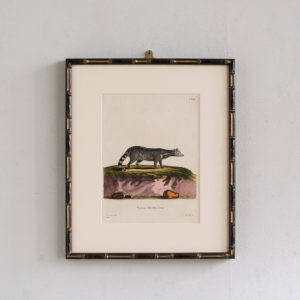
De Buffon, 18th Century natural history,
£150 eachDe Buffon, 18th Century natural history,
Animal prints, based on he work of Georges-Louis Leclerc, count de Buffon, who attempted to systematically present all existing knowledge in the fields of natural history, geology, and anthropology in a single publication. Published c1740, Latin and German text. Presented in faux bamboo frames. 'Viverra Zibetha Linn'.£150 each -
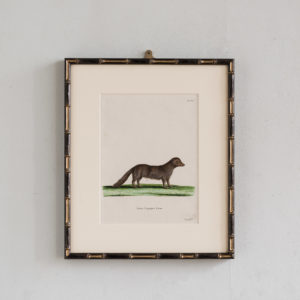
De Buffon, 18th Century natural history,
£150 eachDe Buffon, 18th Century natural history,
Animal prints, based on he work of Georges-Louis Leclerc, count de Buffon, who attempted to systematically present all existing knowledge in the fields of natural history, geology, and anthropology in a single publication. Published c1740, Latin and German text. Presented in faux bamboo frames. 'Canis Lagopus Linn.'.£150 each -
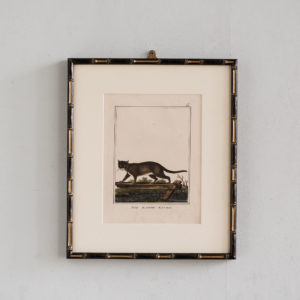
De Buffon, 18th Century natural history,
£150 eachDe Buffon, 18th Century natural history,
Animal prints, based on he work of Georges-Louis Leclerc, count de Buffon, who attempted to systematically present all existing knowledge in the fields of natural history, geology, and anthropology in a single publication. Published c1740, Latin and German text. Presented in faux bamboo frames. 'Die Zahme Katze'.£150 each -
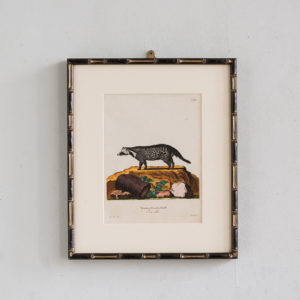
De Buffon, 18th Century natural history,
£150 eachDe Buffon, 18th Century natural history,
Animal prints, based on he work of Georges-Louis Leclerc, count de Buffon, who attempted to systematically present all existing knowledge in the fields of natural history, geology, and anthropology in a single publication. Published c1740, Latin and German text. Presented in faux bamboo frames. 'Viverra Civetta Buff.'.£150 each -
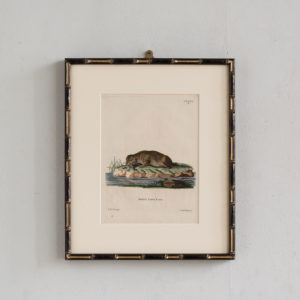
De Buffon, 18th Century natural history,
£150 eachDe Buffon, 18th Century natural history,
Animal prints, based on he work of Georges-Louis Leclerc, count de Buffon, who attempted to systematically present all existing knowledge in the fields of natural history, geology, and anthropology in a single publication. Published c1740, Latin and German text. Presented in faux bamboo frames. 'Mustela Lutra Linn.'.£150 each -
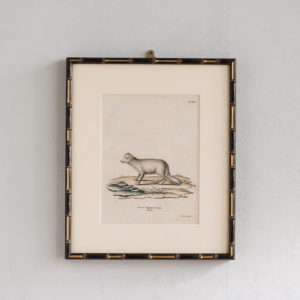
De Buffon, 18th Century natural history,
£150 eachDe Buffon, 18th Century natural history,
Animal prints, based on he work of Georges-Louis Leclerc, count de Buffon, who attempted to systematically present all existing knowledge in the fields of natural history, geology, and anthropology in a single publication. Published c1740, Latin and German text. Presented in faux bamboo frames. 'Canis Lagopus Linn.'.£150 each -
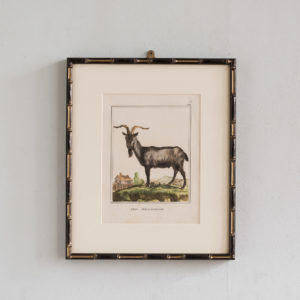
De Buffon, 18th Century natural history,
£150 eachDe Buffon, 18th Century natural history,
Animal prints, based on he work of Georges-Louis Leclerc, count de Buffon, who attempted to systematically present all existing knowledge in the fields of natural history, geology, and anthropology in a single publication. Published c1740, Latin and German text. Presented in faux bamboo frames. 'Der Ziegenbock.£150 each -
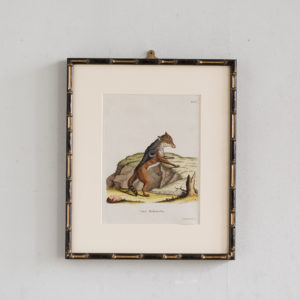
De Buffon, 18th Century natural history,
£150 eachDe Buffon, 18th Century natural history,
Animal prints, based on he work of Georges-Louis Leclerc, count de Buffon, who attempted to systematically present all existing knowledge in the fields of natural history, geology, and anthropology in a single publication. Published c1740, Latin and German text. Presented in faux bamboo frames. 'Canis Mesomelas.'.£150 each -
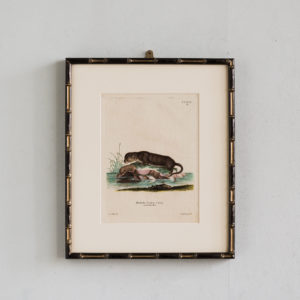
De Buffon, 18th Century natural history,
£150 eachDe Buffon, 18th Century natural history,
Animal prints, based on he work of Georges-Louis Leclerc, count de Buffon, who attempted to systematically present all existing knowledge in the fields of natural history, geology, and anthropology in a single publication. Published c1740, Latin and German text. Presented in faux bamboo frames. 'Mustela Lutra Linn. canadensis'.£150 each -
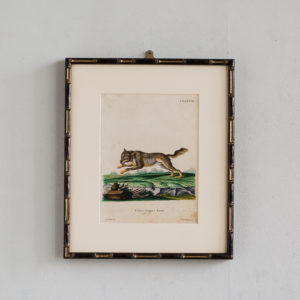
De Buffon, 18th Century natural history,
£150 eachDe Buffon, 18th Century natural history,
Animal prints, based on he work of Georges-Louis Leclerc, count de Buffon, who attempted to systematically present all existing knowledge in the fields of natural history, geology, and anthropology in a single publication. Published c1740, Latin and German text. Presented in faux bamboo frames. 'Canis Lupus Linn.'.£150 each -
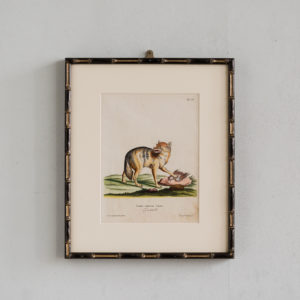
De Buffon, 18th Century natural history,
£150 eachDe Buffon, 18th Century natural history,
Animal prints, based on he work of Georges-Louis Leclerc, count de Buffon, who attempted to systematically present all existing knowledge in the fields of natural history, geology, and anthropology in a single publication. Published c1740, Latin and German text. Presented in faux bamboo frames. 'Canis aureus Linn'.£150 each -
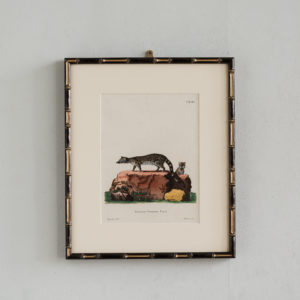
De Buffon, 18th Century natural history,
£150 eachDe Buffon, 18th Century natural history,
Animal prints, based on he work of Georges-Louis Leclerc, count de Buffon, who attempted to systematically present all existing knowledge in the fields of natural history, geology, and anthropology in a single publication. Published c1740, Latin and German text. Presented in faux bamboo frames. 'Viverra Genetta Linn'.£150 each -
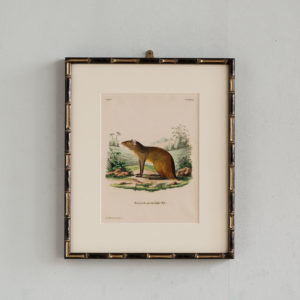
De Buffon, 18th Century natural history,
£150 eachDe Buffon, 18th Century natural history,
Animal prints, based on he work of Georges-Louis Leclerc, count de Buffon, who attempted to systematically present all existing knowledge in the fields of natural history, geology, and anthropology in a single publication. Published c1740, Latin and German text. Presented in faux bamboo frames. 'Dasyprocta prymnolopha Wglr.'.£150 each -
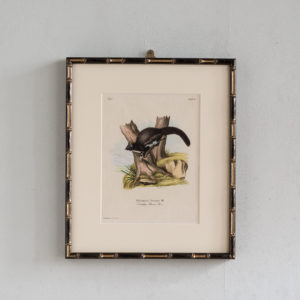
De Buffon, 18th Century natural history,
£150 eachDe Buffon, 18th Century natural history,
Animal prints, based on he work of Georges-Louis Leclerc, count de Buffon, who attempted to systematically present all existing knowledge in the fields of natural history, geology, and anthropology in a single publication. Published c1740, Latin and German text. Presented in faux bamboo frames. 'Phalangista Petaurus'.£150 each -
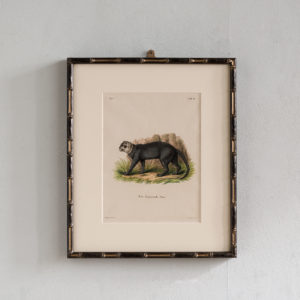
De Buffon, 18th Century natural history,
£150 eachDe Buffon, 18th Century natural history,
Animal prints, based on he work of Georges-Louis Leclerc, count de Buffon, who attempted to systematically present all existing knowledge in the fields of natural history, geology, and anthropology in a single publication. Published c1740, Latin and German text. Presented in faux bamboo frames. 'Felis Yaguarondi Azar'.£150 each -
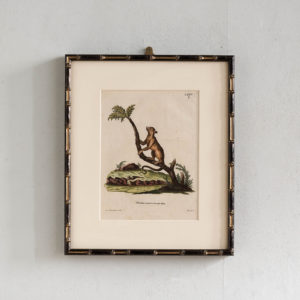
De Buffon, 18th Century natural history,
£150 eachDe Buffon, 18th Century natural history,
Animal prints, based on he work of Georges-Louis Leclerc, count de Buffon, who attempted to systematically present all existing knowledge in the fields of natural history, geology, and anthropology in a single publication. Published c1740, Latin and German text. Presented in faux bamboo frames. 'Viverra caudivolvula Pali'.£150 each -
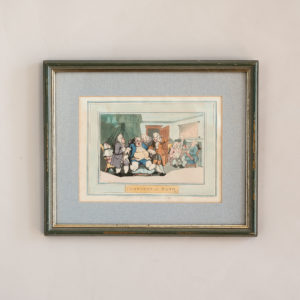
The Comforts of Bath, published 1858
£140 eachThe Comforts of Bath, published 1858
The Comforts of Bath is a series of 12 etchings by Thomas Rowlandson. Each etching is accompanied by verse extracts from Christopher Anstey’s 'New Bath Guide'£140 each -
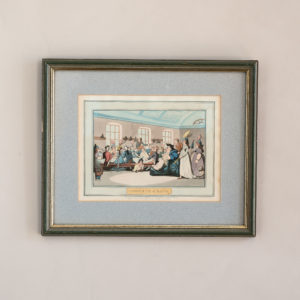
The Comforts of Bath, published 1858
£140 eachThe Comforts of Bath, published 1858
The Comforts of Bath is a series of 12 etchings by Thomas Rowlandson. Each etching is accompanied by verse extracts from Christopher Anstey’s 'New Bath Guide'£140 each -
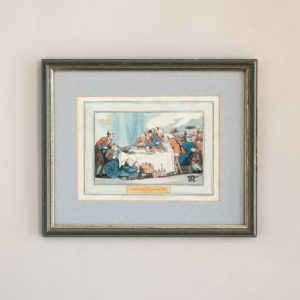
The Comforts of Bath, published 1858
£140 eachThe Comforts of Bath, published 1858
The Comforts of Bath is a series of 12 etchings by Thomas Rowlandson. Each etching is accompanied by verse extracts from Christopher Anstey’s 'New Bath Guide'£140 each -
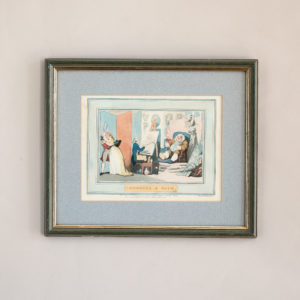
The Comforts of Bath, published 1858
£140 eachThe Comforts of Bath, published 1858
The Comforts of Bath is a series of 12 etchings by Thomas Rowlandson. Each etching is accompanied by verse extracts from Christopher Anstey’s 'New Bath Guide'£140 each -
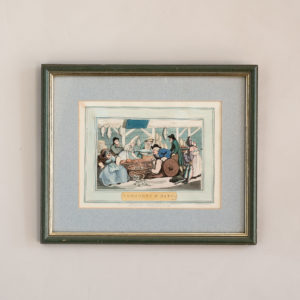
The Comforts of Bath, published 1858
£140 eachThe Comforts of Bath, published 1858
The Comforts of Bath is a series of 12 etchings by Thomas Rowlandson. Each etching is accompanied by verse extracts from Christopher Anstey’s 'New Bath Guide'£140 each -
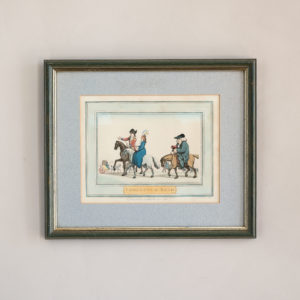
The Comforts of Bath, published 1858
£140 eachThe Comforts of Bath, published 1858
The Comforts of Bath is a series of 12 etchings by Thomas Rowlandson. Each etching is accompanied by verse extracts from Christopher Anstey’s 'New Bath Guide'£140 each -
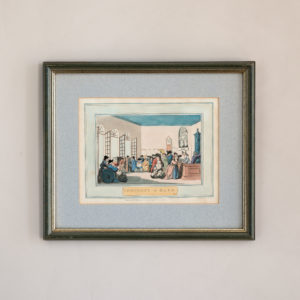
The Comforts of Bath, published 1858
£140 eachThe Comforts of Bath, published 1858
The Comforts of Bath is a series of 12 etchings by Thomas Rowlandson. Each etching is accompanied by verse extracts from Christopher Anstey’s 'New Bath Guide'£140 each -
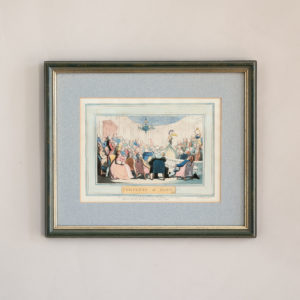
The Comforts of Bath, published 1858
£140 eachThe Comforts of Bath, published 1858
The Comforts of Bath is a series of 12 etchings by Thomas Rowlandson. Each etching is accompanied by verse extracts from Christopher Anstey’s 'New Bath Guide'£140 each -
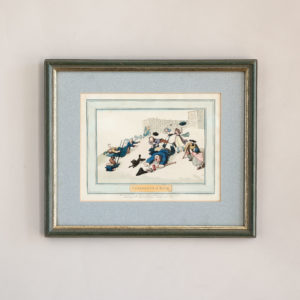
The Comforts of Bath, published 1858
£140 eachThe Comforts of Bath, published 1858
The Comforts of Bath is a series of 12 etchings by Thomas Rowlandson. Each etching is accompanied by verse extracts from Christopher Anstey’s 'New Bath Guide'£140 each -
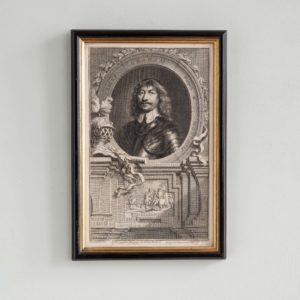
James Graham Marquis of Montrose
£120James Graham Marquis of Montrose
A framed copper plate engraving of James Graham, the Great 1st Marquis of Montrose, Hannibal of the Highlands, by the Dutch engraver Jacobus Houbrackenn, struck in 1740.£120 -
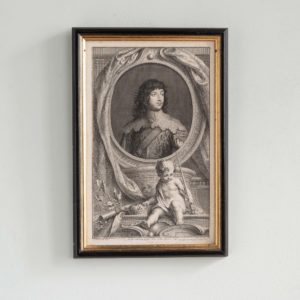
William Russell Earl of Bedford,
£120 -
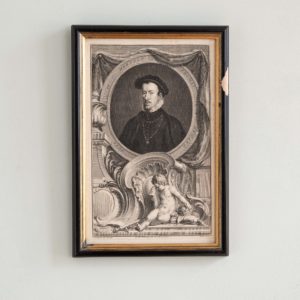
Thomas Howard, Duke of Norfolk,
£120 -
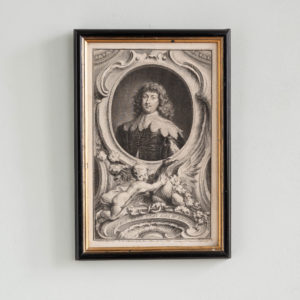
George Lord Digby, Earl of Bristol,
£120George Lord Digby, Earl of Bristol,
A framed copper plate engraving of George Digby Second Earl of Bristol by the Dutch engraver Jacobus Houbrackenn, struck in 1740.£120
Featured Items
-
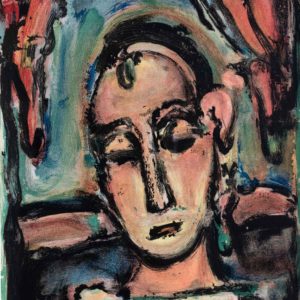
Head of a Girl by George Rouault, Verve Vol 2 / No. 5-6.
£800Head of a Girl by George Rouault, Verve Vol 2 / No. 5-6.
The Verve Review was a purposefully luxurious. It ran from 1937 to 1960, but with only 38 editions available, due to the high degree of design and editorial work dedicated to each issue. Each edition contained unique lithographic prints, commissioned by the editor, and each cover a double-page lithograph elaborated by one of the artists contained within. It was the brainchild of its editor Stratis Eleftheriades, a Greek National who moved to Paris in the early thirties to take part in the growing Modernist movement, writing under the name of Teriade.£800 -
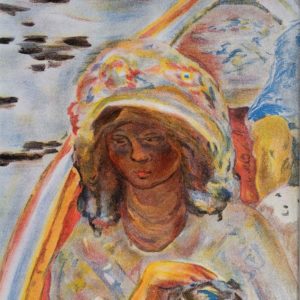
Portrait Fragment by Pierre Bonnard, Verve Vol 2 / No. 5-6.
£600Portrait Fragment by Pierre Bonnard, Verve Vol 2 / No. 5-6.
The Verve Review was a purposefully luxurious. It ran from 1937 to 1960, but with only 38 editions available, due to the high degree of design and editorial work dedicated to each issue. Each edition contained unique lithographic prints, commissioned by the editor, and each cover a double-page lithograph elaborated by one of the artists contained within. It was the brainchild of its editor Stratis Eleftheriades, a Greek National who moved to Paris in the early thirties to take part in the growing Modernist movement, writing under the name of Teriade.£600 -
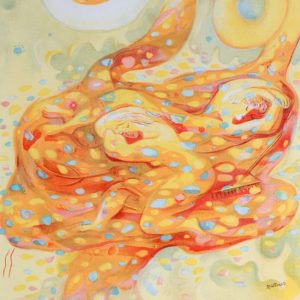
Autumn by Abraham Rattner, Verve Vol. 1 / No. 3.
£600Autumn by Abraham Rattner, Verve Vol. 1 / No. 3.
The Verve Review was a purposefully luxurious. It ran from 1937 to 1960, but with only 38 editions available, due to the high degree of design and editorial work dedicated to each issue. Each edition contained unique lithographic prints, commissioned by the editor, and each cover a double-page lithograph elaborated by one of the artists contained within. It was the brainchild of its editor Stratis Eleftheriades, a Greek National who moved to Paris in the early thirties to take part in the growing Modernist movement, writing under the name of Teriade.£600 -
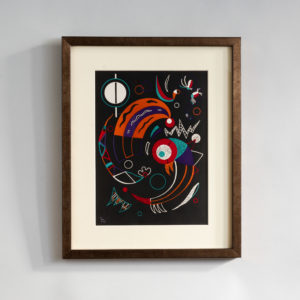
Comets by Wassily Kandinsky, Verve Vol. 1 / No. 2.
£800Comets by Wassily Kandinsky, Verve Vol. 1 / No. 2.
The Verve Review was a purposefully luxurious. It ran from 1937 to 1960, but with only 38 editions available, due to the high degree of design and editorial work dedicated to each issue. Each edition contained unique lithographic prints, commissioned by the editor, and each cover a double-page lithograph elaborated by one of the artists contained within. It was the brainchild of its editor Stratis Eleftheriades, a Greek National who moved to Paris in the early thirties to take part in the growing Modernist movement, writing under the name of Teriade.£800
